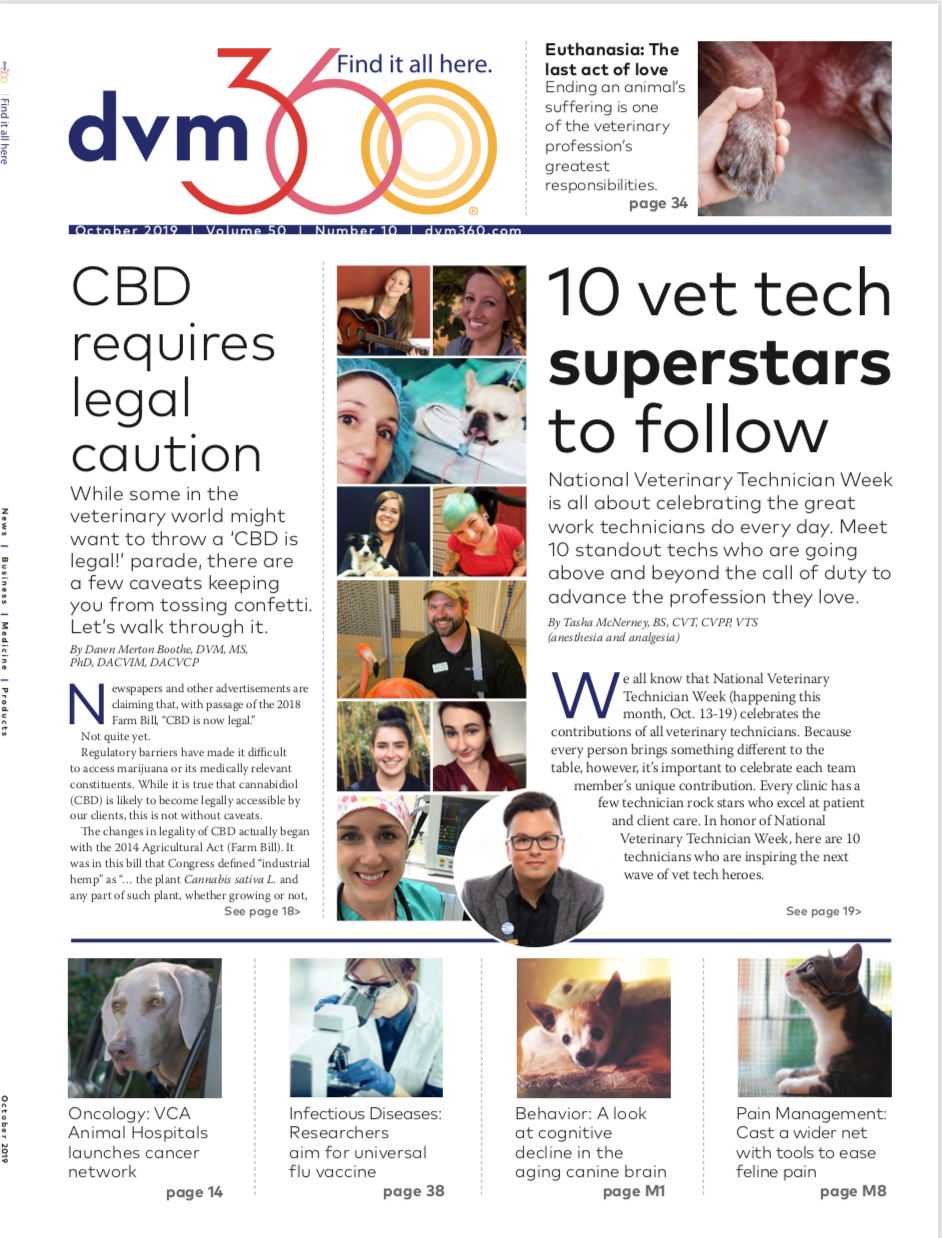Veterinary products now and for future wow
Autoinjectors, injectables and iodine-laced water are just a few products veterinarians might be interested in, courtesy of the Kansas City Animal Health Corridor Investment Forum.
Each year in Kansas City, Missouri-in the land of food animal science and, thus, a big segment of the animal health industry-startup CEOs and entrepreneurs hungry for investment dollars show up to pitch a panel of judges and company representatives in attendance. In addition to whatever deals start at the forum, Kansas City Animal Health Corridor organizers also give a $10,000 Innovation Award to the big winner.
Many of these companies don't have products relevant to the small animal practitioner, but there are always gems that catch the eye of the dvm360 team in attendance.
Soothing a seizure at home
Pet owners with epileptic dogs could administer anti-seizure drugs at home more easily with the right device. That's where the “autoinjector” presented by MesaGreen Pharmaceuticals' Tim Warneke comes in.
“The injection by the autoinjector can mimic the force of an intramuscular injection,” says Warneke, getting treatment faster to a seizing patient.
“The injector is still in testing,” Warneke says, “but it's the same mechanics as already approved in the human drug market.”
A solution to trypanophobia
That's fear of needles, and CEO Yotam Kaufman pitched the audience on an alternative to traditional needles for subcutaneous fluid treatment in pet owners' homes.
“No one likes needles, that's obvious, but sometimes people need to inject their pets alone on a regular basis,” Kaufman says. And why shouldn't veterinary medicine get fancy devices like those for human patients with diabetes for regular insulin shots?
“Humans have had automatic needles for ages now,” he says.
The EZXS device (pictured on the company's website) replaces a hand-driven needle with a clip for a scruff that's attached to a cartridge system that pet owners (or veterinary team members) turn to insert, then turn back to remove and empty. Attached to the device could be fluids today, and perhaps injectable drugs or vaccines in the future.
When needled by the panelist judges about what veterinarians thought about the device, Kaufman explained they've spoken to more than 100 and “they all like it, because they know the pain associated with doing this at home.”
A kit for a pet with chronic kidney disease would retail for $75 for 30 uses, with an occasional-use kit with four uses for $25. The prototype is being tested with cats now in veterinary hospitals and is not yet available for purchase.
Hey, horse docs! Why don't bits do more?
They can, says Equine Smartbit cofounder Shower Zhang, including replace multiple sensors. This device (with a possible retail price of $750 and six-hour battery life) captures heart rate, oxygen saturation, body temperature and activity.
A bit like this could offer more comprehensive wellness data to veterinarians before visits as well as monitor activity and other vitals while a horse recovers from injury. The device delivers data via Bluetooth to the cloud.
Competitive devices in the market are all clipped onto bridles or onto the horses' bodies, says Zhang. There is no product release date yet.
Monoclonal antibody products built it in a mouse
Monoclonal antibody products are a healthy and growing part of human medicine (Humira is one blockbuster), and PetMedix founder and CEO Tom Weaver sees the same future growth in veterinary medicine. Right now, the only veterinary monoclonal antibody product is Zoetis' Cytopoint for canine allergic dermatitis.
These products come in two flavors: 1) phage therapy, using bacteriophages to treat bacterial infections, and 2) species-specific therapy, using transgenic mice, as in the case of PetMedix.
“We're putting a dog's immune system into a mouse,” Weaver says. “We have literally replaced the mouse's genes, so we can immunize with a dog-targeted protein from that mouse. With our method, you let the mouse be the protein engineer, and it's far better than those of us in the lab [with phage-derived therapy] could do.”
Weaver says the company plans to develop three veterinary drugs in the next five years but is starting with oncology, as Weaver (a human oncologist) and his team have previous experience in that field.
Injectable drugs administered in the practice
You know injectables are one way to keep pharmacy sales in your practice. Even better, companies like Cornerstone Animal Health are looking for unique ways to make them better and longer-lasting.
With a pain product on the way, the company creates injectables that use a patented “depot” technology from human medicine called BEPO (rhymes with "depot") to create a subcutaneous pocket for sustained, long-term delivery in optimal therapeutic ranges. The depot can be removed after the injectable has run its course.
“We held a focus group with veterinarians, and they shared with us that this product or a line of products like this gives them the ability to put the syringe back in their hand to get customer compliance and make sure the treatment goes as planned,” says partner Vince Palasota. “This would be a product to help them capture some of the market share they've lost to retailers and online stores.”
The company is looking for partners who want to use BEPO for drug delivery to veterinary patients.
Putting practice software to actual work
Everyone's practice software keeps and collects important information, but how many veterinary practice owners actually put all that information to work for the business?
Steve Kornfeld, DVM, CPCC, with Vmartec, talked up the company's Practice Builder, which seeks to make better use of current clients and wake up dormant clients to appointments again. The system includes direct marketing campaigns for 18 of the most commonly seen conditions and uses software to put clients into specific groups based on their interests and their pets' current conditions. A client list puts people in a campaign in descending order for calls and communication. Training modules share tips for phone and exam room communication during the campaigns. There's also a dashboard that shows off up to 26 graphs about the campaign timing and numbers daily.
Pricing for Practice Builder starts at $595 per month and depends on the number of clients in individual campaigns.
Could iodine beat doggie halitosis?
President and chairman of Assure Pet Health James Richards understands one thing every veterinary professional knows: The human-animal bond is harmed by bad breath.
Richards pitched his Pet Plaque Prevention System (P3S), an automated water bowl that delivers molecular iodine into a water tank with an antiseptic cartridge and an RFID-enabled dog collar to signal it's time to drop into the water. After a dog drinks, a charcoal filter removes leftover iodine.
“A tiny amount of our iodine added to water has no taste or smell, but removes bacteria responsible for halitosis,” Richards says, whose device has the Veterinary Oral Health Council seal of approval.
Richards estimates retail pricing at $100 for the unit (which comes in different sizes for different dogs) and $18 a month for cartridges.
Yeah, but who won?
SwineTech co-founder and CEO Matthew Rooda (middle)—with technology to save piglets from accidental crushing by sows—received a check for the $10,000 Innovation Award from Kansas City Animal Health Corridor advisory board members Karthik Ramachandran (left) and Chris Ragland. (Image courtesy of Kansas City Animal Health Corridor)

The winner of this year's KC Animal Health Corridor 2019 Innovation Award wasn't for companion animals but for swine. The device, from SwineTech, monitors sounds piglets make when housed with sows. If a piglet makes a repeated, distressed squeal that indicates a sow has rolled onto the piglet, a patch on the sow sends an electrostimulation signal that gets mom to stand up again. Co-founder and CEO Matthew Rooda, who grew up with his swine-farming dad, says initial tests are seeing success. Turns out, saving the lives of cute piglets tugs at audience heartstrings and makes good financial sense.
